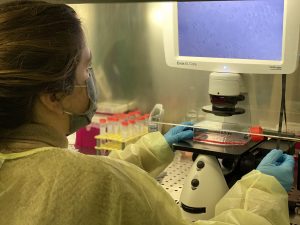Many of the tumors in companion animals are comparable to human tumors and can serve as a model in epidemiological studies and clinical trials.
In clinical trials, companion animals are better positioned than animal models, such as laboratory mice, because in addition to being exposed to similar environmental risk factors, they develop cancer spontaneously and quickly, which favors clinical results. In the future, it is expected that companion animals can be used as sentinels for risky environments for humans, enabling the adoption of preventive measures appropriate to human and environmental health.
Vet-OncoNet is a network for sharing information on companion animal tumors and research of risk factors. This platform is an initiative of ICBAS and the Institute of Public Health of the University of Porto (ISPUP), framed in the One Health policies of these institutions. It involves researchers from the departments of Population Studies, Veterinary Clinics, Pathology and Molecular Immunology at ICBAS and the Department of Veterinary Public Health of ISPUP. The University of Trás-os-Montes and Alto Douro (UTAD) joined this initiative, becoming a co-founding institution of the Vet-OncoNet Network. Built on the pillars of the One Health concept and vision, it aims to contribute to progress in prevention and therapy in animal and human oncology. They mutually benefit from this joint approach and knowledge sharing between scientists from different fields.
Within this academic-scientific context, Vet-OncoNet's mission is to develop scientific activity, teaching, dissemination, and communication of credible information in the field of Animal Oncology.
To know more:
– Vet-Onconet: Information sharing network on neoplasms of pets and investigation of risk factors
Contact: Professor João Niza Ribeiro (jjribeiro@icbas.up.pt)




